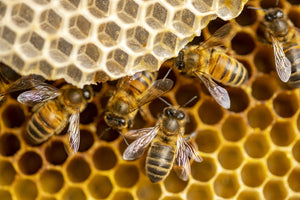Exploring the Benefits of Honey in Tea

Tea has long been cherished as a soothing beverage, enjoyed by cultures around the world for its diverse flavors and calming properties. And for basically the entire time we’ve been brewing and consuming tea, people have sought the perfect complement to brighten the flavor of their favorite tea, and while sugar has been the most common and readily available choice, there is a strong contender to consider: honey.
Honey not only adds a natural sweetness to tea but also offers a multitude of health benefits that make it an exceptional choice for tea enthusiasts. Today, let’s explore the advantages of using honey as a sweetener for tea, as well as the crucial differences between real honey and imitation honey.
The Healthful Advantages of Honey in Tea
Luckily for us, honey not only tastes good, but it’s also helpful to our health too! Here are a few benefits of choosing honey as a sweetener over other sweeteners (like sugar):
Natural Nutrients: Unlike refined sugar, which provides empty calories, honey is a natural product made by bees from the nectar of flowers. This golden elixir contains essential nutrients like vitamins (B complex, vitamin C, and more), minerals (iron, calcium, potassium, and magnesium), antioxidants, and enzymes. When you sweeten your tea with honey, you're not just adding sweetness; you're infusing your tea with a range of beneficial nutrients.
Antioxidant Powerhouse: Honey is rich in antioxidants, which help protect the body from harmful free radicals[1]. These antioxidants can support the immune system, promote healthy skin, and even aid in reducing the risk of chronic diseases. When combined with the antioxidants naturally present in tea, such as catechins in green tea[2], honey amplifies the tea's health benefits.
Digestive Aid: Honey has been used for its digestive properties for centuries. It can help soothe an upset stomach, aid in digestion, and alleviate issues like indigestion and bloating. Adding honey to your tea can create a comforting and gentle beverage to enjoy after a meal.
Sore Throat Relief: The soothing properties of honey make it a go-to remedy for sore throats and coughs. When stirred into a warm cup of tea, honey can provide relief and comfort, coating the throat and reducing irritation.
Energy Boost: Honey is a natural source of carbohydrates, providing a quick energy boost. When you add honey to your tea, it can be an excellent alternative to other energy-boosting beverages laden with artificial additives and excessive sugars.
Real Honey vs. Imitation Honey
As the demand for honey has increased, so has the market for imitation honey. It's important to distinguish between real honey and its artificial counterparts to make informed choices when choosing your sweetener, and luckily it’s also not too difficult to tell between them.
Real Honey
- Ingredients: Pure honey is made by bees, who collect nectar from flowers and convert it into honey through a natural enzymatic process.
- Consistency: Real honey tends to have a thick and viscous consistency. When poured, it may form a slow, continuous stream rather than quickly flowing like water.
- Texture: It has a thick and sticky texture, often clinging to the spoon when poured.
- Taste: Real honey has complex flavors, reflecting the various flowers from which the bees collected nectar.
- Crystallization: Over time, real honey may crystallize, turning into a grainy texture. However, gentle heating can reverse this process without compromising its quality.
Imitation Honey
- Ingredients: Imitation honey is typically a blend of various sweeteners like high-fructose corn syrup, glucose syrup, artificial sweeteners, and flavorings. They will also typically have artificial coloring added as well.
- Appearance: It may look like real honey at first glance, but it often lacks the richness and color variation seen in natural honey. Imitation honey will often look exceptionally clear, where real honey will often have a slight cloudiness to it.
- Texture: Imitation honey tends to be thin and watery, lacking the viscosity of real honey.
- Taste: It lacks the complex taste of real honey, often being overly sweet without the nuanced flavors.
- Crystallization: Imitation honey does not crystallize since it lacks the natural components found in real honey.
How to Tell Real Honey from Imitation Honey
- Read the Label. Check the ingredient list. Pure honey should have only one ingredient: "honey” (who would have guessed?!). Avoid products that list added sweeteners or artificial ingredients. Pure honey is simply honey taken straight from a bee hive, with little to no processing, and poured into a bottle. The ingredients list shouldn’t show things like “high fructose corn syrup” or anything like that.
- Price. Real honey is a labor-intensive product, and its price reflects that. If the price seems too good to be true, it probably is! If you walk into the grocery store and see a range of prices for honey, it’s very likely that the cheaper ones are fake.
- Appearance and Texture: Observe the color and texture of the honey. Real honey will have variations in color and a thicker consistency.
- Water Test: Mix a tablespoon of honey into a glass of water. Real honey will settle at the bottom, while imitation honey will dissolve or disperse in the water.
- Label Certifications: Look for reputable certifications on the label, such as "100% Pure Honey" or "USDA Organic," which provide assurance of authenticity.
Support Your Local Hive!
Honey bees can thrive in most parts of the United States, which means chances are you might even live relatively close to a local beekeeper where you can get your honey fresh right from the source. And because bees are a crucial part of the pollination process for many of the foods we enjoy, you also get the added effect of supporting your local busy-bees.
To find a local honey source around your area, check out this helpful online map:
You’ll be able to pick your state and county and see a list of local honey producers in your area.
In conclusion, honey is a delightful and healthful alternative to refined sugar when sweetening tea. With its natural nutrients, antioxidant properties, and numerous health benefits, honey enhances the tea-drinking experience. However, it is crucial to be vigilant when purchasing honey to ensure you are getting the real deal! By choosing pure and authentic honey, you not only savor the genuine taste but also reap the full array of advantages it has to offer. So, the next time you brew a cup of tea, consider reaching for the golden sweetness of real honey.
Cheers to a healthier and sweeter tea-drinking experience!
Sources:

